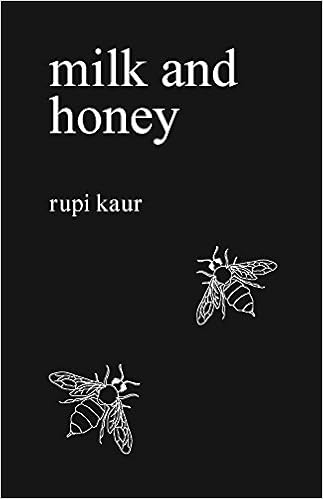My student, when she realized that she would have to do a book talk on it, alerted me to some concerns about how to present on it appropriately. I flipped through her copy and immediately saw the issue, but she and I talked it through and she successfully (and appropriately) presented it to the class. Less than a day later, the media center specialist called me over to ask about the book. In the way these things tend to happen, the book had first been delivered to the middle school by mistake. So by the time it made it up to the high school, both principals at the middle school had flipped through it and had grave concerns. These concerns were shared with the High School principal and the media center specialist. At this point, it was time to ask the resident bibliovore for an opinion and that's me.
 Milk and Honey is a collection of diary style poetry and prose having to do with the Kaur's first 21 years. She had a rough time of it. She experienced abuse and pain, but she also experienced love and healing. There are many references to sex and some of the line drawings are a bit suggestive. In several places Kaur expresses her experiences graphically.
Milk and Honey is a collection of diary style poetry and prose having to do with the Kaur's first 21 years. She had a rough time of it. She experienced abuse and pain, but she also experienced love and healing. There are many references to sex and some of the line drawings are a bit suggestive. In several places Kaur expresses her experiences graphically.There's nothing wrong with this book. It's memoir. These poems are this woman's experiences. It might make me wince in places but it didn't feel like shock value to me, just the expression of a woman who refuses to feel shame for what happened to her. In terms of theme, this is an excellent book for young women to read as it is very much a book about healing and finding strength in experience.
The problem, as far as I can tell, is that there is a sizable group of people out there that insist this is a YA title. It isn't. Just because the author was of the same age as the YA set while going through the events of the memoir doesn't mean that it's aimed at the YA audience. Conversely, that also doesn't mean young adults in their late teens and up shouldn't read it either. There is value in texts like this in that it models response to horrible situations and provides insight. We could all do with more insight.
I am uncomfortable with the idea of censorship which is why I worked with my student so that she could present Milk and Honey to the class. Censorship empowers the thing that is censored. If an idea is seen as dangerous that makes it more appealing to most people. That is just human nature. I'd rather face such things head on and talk them through. I am however sensitive to the position of parents and school administrators.
Our media center serves both the high school and middle school. A book like this is not appropriate for younger audiences, and I support the decision to keep it off the media center shelves. However, as a compromise she gave the book to me for my classroom collection. My collection is something that I have more control over. I have a collection of books that I keep separate from my main collection that I give to students if they ask for them and I think they are mature enough. In some cases, I call home and explain the book to the parents and ask them to decide if they want their child to read it.
In the case of Milk and Honey, I admit to some ambivalence. I will happily support a student's desire to read difficult material even if the ideas make me uncomfortable. There is a lot of buzz about Milk and Honey and it keeps coming up in my conversations with my students because it was a recent best seller. It'll take time for the buzz to die, and until it does, it is best that we have a copy so that we know what is floating around the student body. On the other hand, I don't relish the conversations with the parents. While I believe there is nothing wrong with the book, I also don't think it's some sort of transcendental reading experience.
No comments:
Post a Comment